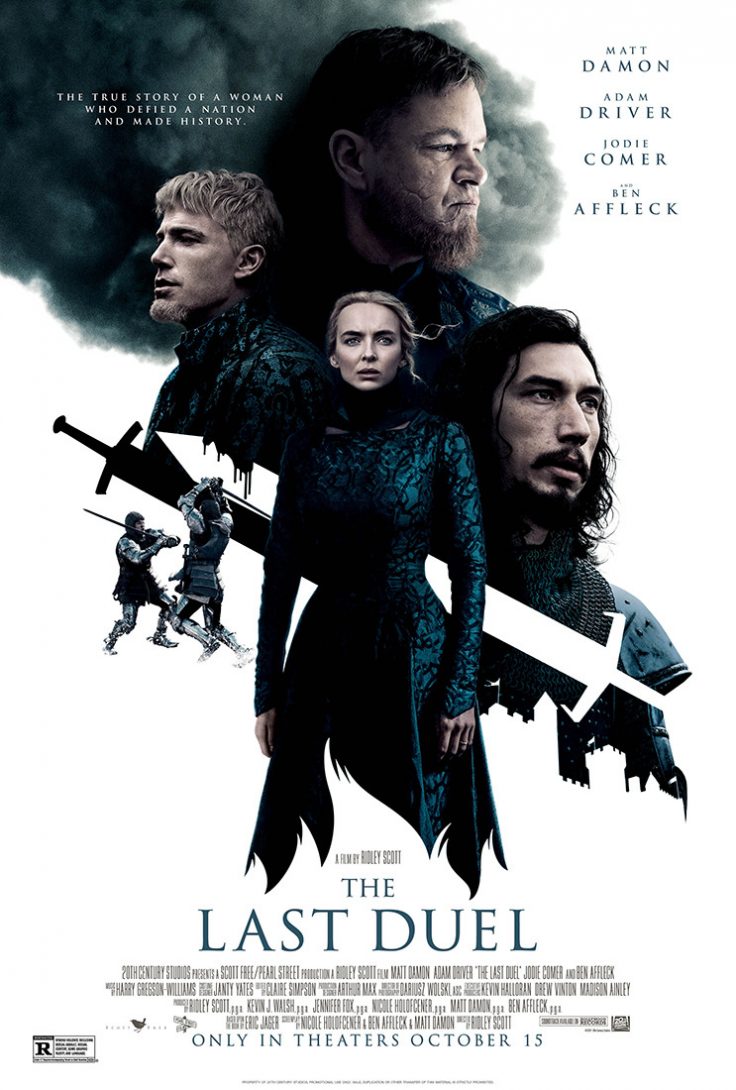I have to confess that The Last Duel takes a little getting used to. It's set in medieval France and it features a scar-riddled Matt Damon sporting facial hair that's almost comically unbecoming—not to mention that weird kind of stilted historical-movie dialogue ("My lord, the accusation is false!") that suggests people in the 14th century spoke in a far more cultured way than we do now. Even the illiterates, like Damon's character, Jean de Carrouges.
Give it a few minutes. The Last Duel is a pip—a thrilling, fascinating, rich, complex, and gripping movie about and for adults that just gets better and deeper and more compelling as it goes along. It tells the story of a battle-tested friendship between Carrouges and Adam Driver's Jacques Le Gris that curdles over time. The clever and worldly Le Gris wins the favor of their common liege lord, Count Pierre (Ben Affleck, who cowrote the screenplay with Damon and Nicole Holofcener), a witty and cold libertine who despises Carrouges for his humorlessness and self-seriousness.
Over time, Le Gris becomes a source of perpetual humiliation for Carrouges. He collects Carrouges's taxes. He ends up with a military post that's been in Carrouges's family for two generations. And he becomes the owner of an estate that was supposed to go to Carrouges as part of his dowry upon marrying the beautiful Marguerite. When Le Gris casts his eyes on Marguerite and can't take them off her, the end result is the duel mentioned in the movie's title.
The Last Duel is based on a historical event. Carrouges and Le Gris were real people and they did fight a duel to the death after Carrouges accused his onetime friend of raping Marguerite. But the real source of The Last Duel is Akira Kurosawa's legendary Rashomon, the 1950 Japanese movie whose title has become cultural shorthand for the idea that if you ask different people about what happened during an incident they all witnessed, you are going to get radically different accounts from each of them.
Until The Last Duel, my favorite retelling of the Rashomon trope was an episode of The Odd Couple in which Felix, Oscar, and Oscar's ex-wife Blanche remember the party at which Oscar and Blanche split up. In Oscar's telling, he was the victim and everybody at the party said "Poor Oscar." In Blanche's telling, she was the victim and everybody said "Poor Blanche." In Felix's telling, he did everything he could to keep them together—and everybody said "Poor Felix."
It's hard to top that, but even though there's not a single laugh in it, The Last Duel does. Rashomon is also about an accusation of rape that leads to a death and is also set in the very distant past (something like the 11th century). But Rashomon is far more concerned with exploring the ambiguities involving human memory and the problem of subjectivity. The events in The Last Duel are seen from three perspectives, each of which gets a chapter title—"The truth according to Jean de Carrouges," "The truth according to Jacques Le Gris," and "The Truth according to the Lady Marguerite." But unlike Rashomon's contrasting versions of the same story, the ones in The Last Duel do not really disagree with one another. Rather, they keep filling in the blanks and making the picture of the conflict between Carrouges and Le Gris far more interesting and far more disturbing.
The central issue explored in The Last Duel is character. Is Carrouges a noble and righteous man defending his honor and that of his wife–or is he a blustering fool who might be consigning her to being burned at the stake? Is Le Gris a charming Machiavellian—or a repugnant sybarite whose self-justifications shade all too easily into outright perjury that might condemn the woman he says he loves to a horrific death? And is Marguerite a virtuous person unfairly hemmed in by a culture that denies her agency or a flirty innocent whose cues are tragically and monstrously misread?
Jodie Comer, the actress who played the polymorphous assassin on the Netflix series Killing Eve, is utterly stunning—she does amazing work here just with her eyes and her pursed lips, giving expression to Marguerite's vivid and tormented internal life from the first second we see her. Driver shows himself yet again to be without peer when it comes to playing seductively solipsistic monsters. And Damon, perhaps the most underrated of the superstars of the past 25 years, is so good at playing Carrouges's many sides that you keep changing your opinion of him from minute to minute.
Still, the surprise of the movie is Affleck, whose turn as a louche nobleman is just spectacular. He runs away with every scene he's in and must be considered the leading contender for a supporting-actor Oscar at this moment (and a likely nominee for his work on the screenplay, an award he and Damon won for Good Will Hunting a quarter century ago).
This guy has had more ups and downs and ups to his career than anyone maybe ever—a huge star in the late 1990s and early 2000s who turned into a laughingstock before remaking himself into a first-class director whose third film, Argo, won Best Picture. And then, having climbed to the top of the mountain, Affleck leapt off it. He tanked his marriage to America's sweetheart, Jennifer Garner, before making the headshaking decision to follow Christian Bale and take on the role of Batman in two of the most risible superhero pictures ever, Batman v Superman and Justice League. He seemed like a goner, but now here he is, back again. Would that the characters in The Last Duel had even a single chance at redeeming themselves, Affleck-style.
